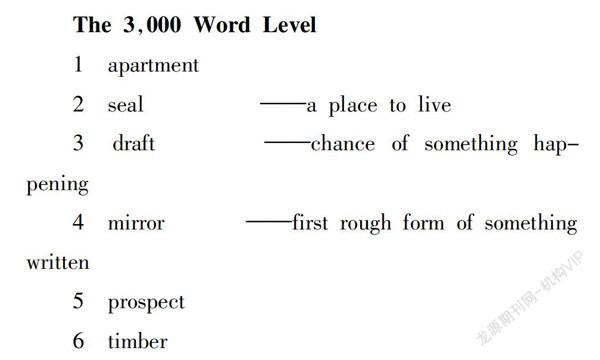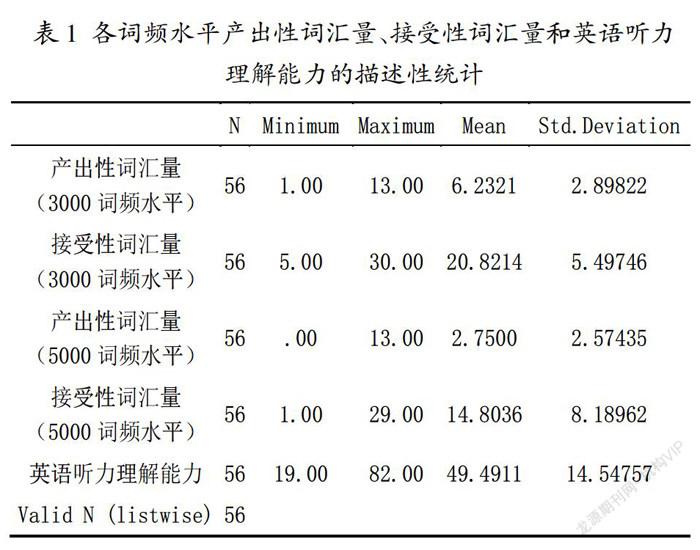产出性和接受性词汇量对英语听力理解能力的影响研究
曾尚春



摘 要:对于英语学习者来说,听力理解一直是学习的难点。因此,很多学者对如何提升英语学习者听力理解能力进行了研究。作者选取了词汇量为切入点,从学习者产出性和接受性词汇量两个维度进行实证研究,选取了某普通二本院校大二翻译专业本科生作为受试者,利用SPSS16.0统计分析软件里的描述统计(Descriptive Statistics),皮尔逊相关关系(Pearson correlation)和线性回归(Linear Regression)这三种方式分析了受试学生产出性和接受性词汇量与其英语听力理解能力的关系,从而进一步得出受试学生词汇量对其英语听力理解能力的解释力。实验结果表明,受试学生产出性词汇量和接受性词汇量与其英语听力理解能力均呈显著正相关。受试学生产出性词汇量(3000词频水平)、接受性词汇量(3000词频水平)、产出性词汇量(5000词频水平)、接受性词汇量(5000词频水平)对其英语听力理解能力的解释力分别为28%、32%、22.8%及20.9%。受试者的词汇量可以有效地解释其英语听力理解能力。
关键词:产出性词汇量;接受性词汇量;英语听力理解能力
中图分类号:G642 文献标志码:A 文章编号:2096-000X(2021)19-0065-06
Abstract: For English learners, listening comprehension has always been a difficult point in learning. Therefore, many scholars have conducted research on how to improve the listening comprehension of English learners. The author conducts empirical research from the two dimensions of learner's productive and receptive vocabulary. A group of second-year undergraduates majoring in translation were selected as the research subject. The author used the Descriptive Statistics, Pearson correlation and Linear Regression in the statistical analysis software SPSS16.0 to analyze the relationship between the undergraduates' productive and receptive vocabulary and their English listening comprehension capability, and then figured out on what extent the test students' vocabulary have influence on their English listening comprehension capability. The result presents significantly positive correlation between test students' receptive vocabulary, productive vocabulary and their English listening comprehension capability. The test students' productive vocabulary size (3000-words level) can predict 28% of students' English listening comprehension capability, receptive vocabulary size (3000-words level)-32%, productive vocabulary size (5000-words level)-22.8%, receptive vocabulary size (5000-words level)-20.9%. To sum up, the testees' vocabulary size can effectively explain their English listening comprehension capability.
Keywords: productive vocabulary size; receptive vocabulary size; English listening comprehension capability
聽力理解是听者充分利用所掌握的语言知识和非语言知识以及相关听力理解技能和策略对外界输入的语音材料进行积极主动地加工和处理以达到理解说话者意图的动态过程。听力理解是外语学习的一项重要技能,作者在多年的外语教学中发现,为了掌握这一技能,学习者往往付出较多的时间和精力,但收效不明显。根据上述听力理解的定义,听者的语言能力对听者是否能听懂外界输入的语音材料起着至关重要的作用。如果从分析外语学习者的语言能力入手,应该能找到一个行之有效的方法来提高其听力理解能力。而语言能力包含词汇能力、语法能力、语义能力、语音能力和拼写能力。因此,本文将以实证研究的方式,分析外语学习者的词汇能力,具体来说,即从外语学习者接受性和产出性词汇量的角度,探索它们对英语听力理解能力产生的影响,以期为外语听力教学提供一定的启示。
1998年劳费尔给出了接受性词汇(Receptive Vocabulary)和产出性词汇(Productive Vocabulary)的定义,即,接受性词汇指的是理解某个特定的词的最基本最常用的意思;产出性词汇被细分为控制性产出性词汇(Controlled Productive Vocabulary)和自由产出性词汇(Free Productive Vocabulary), 前者指的是在给出特定任务的前提下,学习者运用已经习得的词汇;后者指的是学习者按照自己的意愿自主地运用已经习得的词汇。

